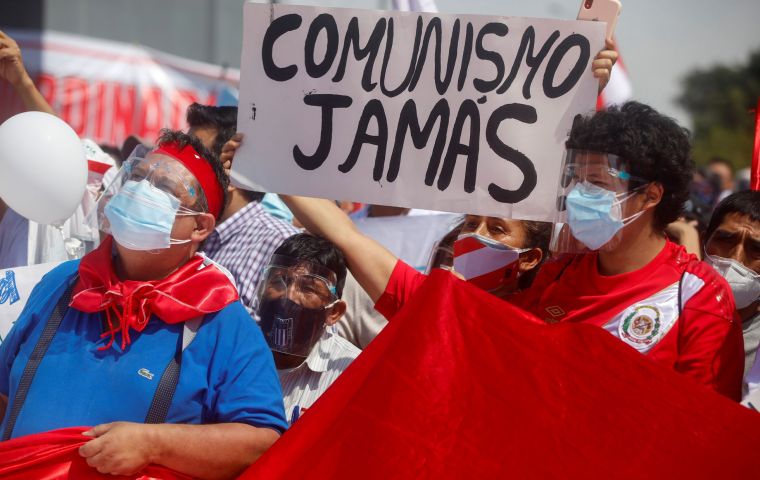MercoPress. South Atlantic News Agency
Peru's fortunes start packing up in case Castillo becomes President
 Peru's wealthiest fear private property and money savings would be at risk under a ruler with populist ideologies. Photo: Reuters
Peru's wealthiest fear private property and money savings would be at risk under a ruler with populist ideologies. Photo: Reuters Peru's wealthiest people feel threatened by the likelihood of leftwing Pedro Castillo becoming the next president and have therefore started wiring money abroad, it was reported.
The elite, who voted en masse for the conservative Keiko Fujimori, fear that private property is at risk under a ruler who has been linked, albeit distantly and with problems in theory, to the ideology of former Venezuelan President Hugo Chávez.
Castillo beat Fujimori by roughly 44,000 votes but is yet to be named President-elect as both candidates have filed for the annulments of the results at specific polling stations where irregularities seem to have been committed.
During his campaign, Castillo pledged to dramatically increase mining taxes on the world's second-largest copper producer to pay for social spending and to rewrite the Constitution to give the government more strength in managing the economy. He has also hinted at possible second land reform.
Fujimori's supporters have shown their fear of the rise of “communism” and have fanned old ghosts of land expropriations and a Venezuelan-style collapse of the economy. Posters even appeared in Lima warning: “Think about your future, not communism.” Castillo is not directly mentioned and no one has claimed responsibility.
As his victory became more likely in recent hours, Castillo softened his rhetoric, rejecting comparisons with authoritarian leaders like Venezuela's Hugo Chávez. He has brought in more moderate advisers, has delivered a pro-market message, and has denied that he plans to nationalize or expropriate banking savings as leading economist advise people to take precautions and keep their money abroad.
The Peruvian sol has fallen about 8% since Castillo surprisingly won the first round on April 11, while the selective index of Peruvian stocks has lost 9% during the same period. Banks and mining companies have been the worst-hit sectors.
And as a land reform also seems likely, some families are taking actions with their properties that could be deemed too large to have just one owner.
Banks have been importing US dollar bills to meet demand, it was reported, as demand for liquidity grows out of fear and probably also bias against a son of peasants from rural northern Peru.
Most residents in uptown Lima-based their support for Fujimori on two previous historical experiences: agrarian reform and its land expropriations in the 1960s and hyperinflation in the 1980s, both under leftist governments.




Top Comments
Disclaimer & comment rulesCommenting for this story is now closed.
If you have a Facebook account, become a fan and comment on our Facebook Page!